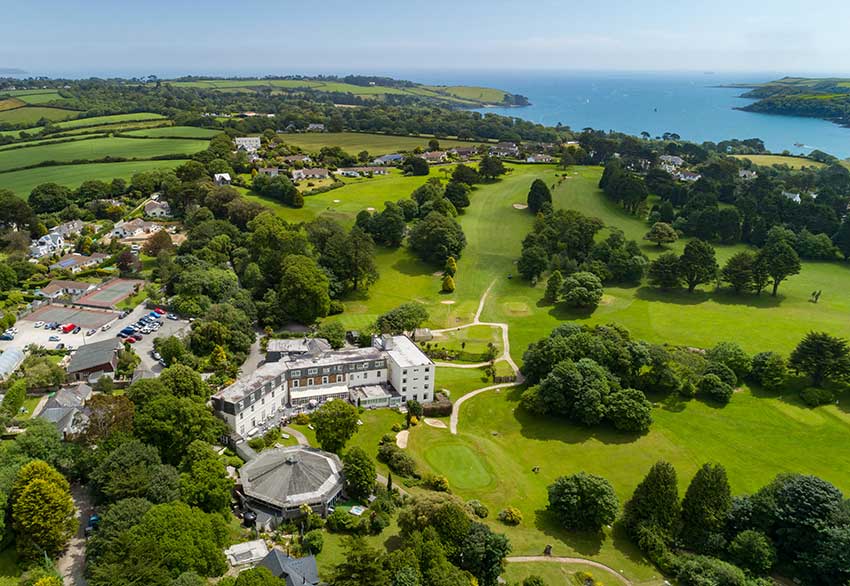News from Budock Vean
The Pender Family – PART 3
The Pender family lived at Budock Vean for nearly 200 years and under their stewardship the house was to become one of the largest and wealthiest in the district. But who exactly were the Penders and what mark have their lives left in this quiet corner of Cornwall for us to discover?
This collection of articles aims to hunt down some of the most interesting characters and discuss some of the most fascinating episodes from their intriguing lives.
While Admiral Francis Pender had taken to the high seas and circumnavigated the globe, his brother Benjamin had remained at home in Cornwall, keeping his feet well and truly on dry land. He had inherited Budock Vean after their father’s death in 1769 and, as well as running the family estate, he also became a Justice of the Peace and a Packet Ship Agent from 1785 onwards.
A Packet Agent was responsible for the receipt and dispatch of the mail on the Packet Ships from Falmouth, which had been transporting letters and parcels for the Post Office across the globe since 1688. The agent also oversaw passenger’s arrivals and departures, and imported goods. It was a very responsible role and they were paid around £260 per year in 1788 to undertake their duties (around £20,000 in today’s money).
Although in the past some agents had been accused of dishonesty, corruption and taking bribes Benjamin Pender (1746 – 1812) was a real stickler for the rules and regulations. Unfortunately however this made him rather unpopular with the ships’ captains, who were used to officials turning a blind eye to certain regular rule bending.
It seems that some captains had fallen into the habit of sending their ships off to sea under the command of an unqualified deputy. This meant that they could stay comfortably ashore while still pocketing the fee for the voyage. In one month in 1793 of the twelve Packets at sea only two actually had their captain on-board.
The Post Office was understandably unhappy with this state of affairs, issuing a memorandum in August 1793 lamenting the potentially dangerous situation of these absentee captains. Pender took their concerns very seriously and began to ruffle a few feathers in Falmouth when he insisted that no ship should sail unless there was a captain on board or alternatively, should the command be given to a lower rank, then that man should be a certified master with all the necessary paperwork.
The Packet captains were furious. Not only did this threatened their leisurely way of life but if their deputy was certified then there was the possibility that he might start to ask for a share of their fees! They saw Pender as interfering and impertinently overstepping his authority by dictating to them how they should run their ships. Rather than relent, however, Pender and the Post Office doubled down by docking the captains’ wages, but as they were already earning exorbitant fees this was little more than an irritation for them. It took several more years of wrangling before eventually the message of ‘sail or be sacked’ finally got through to the captains!
One of Benjamin Pender’s last acts as a Justice of the Peace in March 1812, seven months before his death, was to fine eleven Falmouth shopkeepers and one miller for using defective weights!
Benjamin had married a cousin, Grace Pender, in 1779 and the pair had had eight children, seven girls and one boy, Francis, who inherited Budock Vean in 1812. Francis (1779 – 1849) became a solicitor but like his ancestors before him took an active role in the Falmouth community. He was Town Clerk and Clerk of the Peace for 30 years, Chairman of the Board of Guardians and mayor of Falmouth twice.
It was Francis that began investing in mining at Budock in a rigorous way, naming the mine at the head of the creek just below Budock Vean house Wheal Anna Maria after his wife. In September 1831 newspapers across the country reported that Francis Pender of Budock had discovered “a peculiar and interesting mineral, none of a similar kind has been raised from any other mine in the county”. What made this mineral distinctive isn’t clear but it was taken to the Assay Office in Redruth where Mr. Arthur Penrose determined there was “upwards of 100 ounces of silver per ton and 25 per cent fine copper from the sample”.
The mine, which was known to be rich in copper and lead, remained active, on and off, for many years until it was closed forever in 1906.
Francis married Anna Maria Peter in May 1824 and the couple had four children – Francis Henry in 1825, William Rous Tresillian in 1827, Robert Constantine in 1829 and George Godolphin in 1830. The family lived comfortably at Budock Vean, the 1841 census showed that they had seven live-in servants, including Mary Ann Vosper who was Mrs Pender’s “faithfully attached and estimable servant” and “sincere friend” for some 37 years.
Francis passed away in August 1849 and the Budock Vean estate passed to his second son, William Rous Tresillian Pender.







